牛津上海版高中二年级第二册英语 Unit 6 Problems and solutions教案
牛津上海版高中二年级第二册英语 Unit 6 Problems and solutions学案设计
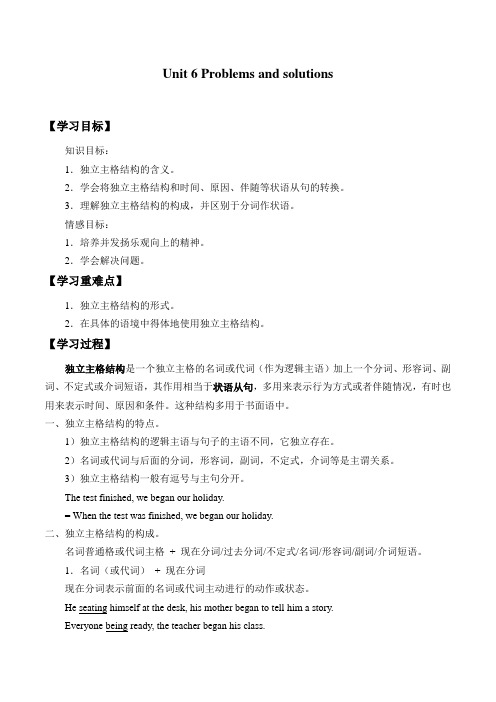
Unit 6 Problems and solutions【学习目标】知识目标:1.独立主格结构的含义。
2.学会将独立主格结构和时间、原因、伴随等状语从句的转换。
3.理解独立主格结构的构成,并区别于分词作状语。
情感目标:1.培养并发扬乐观向上的精神。
2.学会解决问题。
【学习重难点】1.独立主格结构的形式。
2.在具体的语境中得体地使用独立主格结构。
【学习过程】独立主格结构是一个独立主格的名词或代词(作为逻辑主语)加上一个分词、形容词、副词、不定式或介词短语,其作用相当于状语从句,多用来表示行为方式或者伴随情况,有时也用来表示时间、原因和条件。
这种结构多用于书面语中。
一、独立主格结构的特点。
1)独立主格结构的逻辑主语与句子的主语不同,它独立存在。
2)名词或代词与后面的分词,形容词,副词,不定式,介词等是主谓关系。
3)独立主格结构一般有逗号与主句分开。
The test finished, we began our holiday.= When the test was finished, we began our holiday.二、独立主格结构的构成。
名词普通格或代词主格+ 现在分词/过去分词/不定式/名词/形容词/副词/介词短语。
1.名词(或代词)+ 现在分词现在分词表示前面的名词或代词主动进行的动作或状态。
He seating himself at the desk, his mother began to tell him a story.Everyone being ready, the teacher began his class.The food being cooked, the boy was watching TV.注意:现在分词being或having been在独立主格结构中可以省略。
The weather(being)fine, we decided to go on an outing.独立主格结构中的being在下列两种情况下一般不能省略,一是在“There being + 名词”结构中,There being nothing else to do, we went home.二是在逻辑主语是代词的情况下。
牛津高二英语Module 6 Unit2

Reading aloud while listening
Please read the text aloud following the tape, and then finish the True or False questions.
True or false :
1.The topic of TV interview was Sang Lan. 2.Dr.Brain studies happiness. 3.Sang Lan was born in Ningbo,China. 4.Sang Lan became a gymnast when she
7.Sang Lan broke her legs and will never walk again.
8. The world was amazed by Sang Lan’s unexpected injury.
9.Leonardo DiCaprio visited Sang Lan in the hospital.
While staying in hospital
being in good _s_p_i_ri_ts__ knowing the secret to happiness is to think about good things, and to _fo_c_u_s__ on goals thinking about _w__h_a_t_she could do to get better being able to _o_v_e_rc_o__m_e_ her disappointment and being proud of the things she had_a_c_c_o__m_p_l_is_h_e_d__ feeling happy to be _a_l_iv_e__, and lucky to have the rest of her life to learn new things
沪教版高中英语二年级第二学期:Unit 6 Problems and solutions
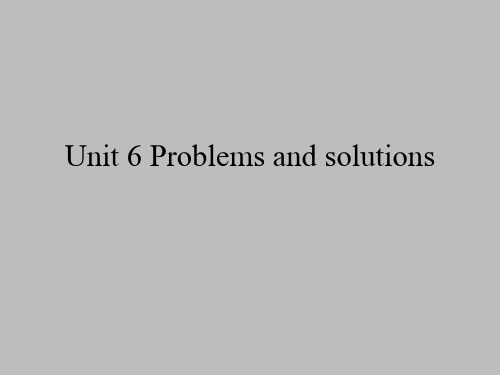
E Read and think
El Choose the best answer that completes these sentences.
E2 Answer the following questions in complete sentences using the information in the brochure.
Unit 6 Problems and solutions
A What do you know about…?
a as food
b as clothing
c for entertainment d in science
B Skimming
C Scanning
D Key words
D1 Answer these questions.
D2 Use the words in the box to complete the passage below. Change the form of the words as necessary.
campaign against cosmetics publicize global alternative limitation principle blind
A writer’s viewpoint refers to what he or she thinks about a certain topic. This viewpoint is shown by the kind of words the writer uses. For example, in the brochure, the writer uses very strong and positive words such as amazing unconventional, revolutionize and remarkably to describe Anita Roddick. From this, we can infer that the writer admired Anita Roddick and the causes she pursued.
牛津高二英语Module 6 Unit 2PPT课件
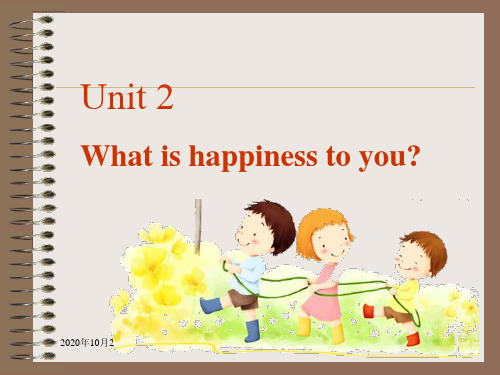
trying to make her parents _p_r_o_u_d____
2020年10月2日
14
While staying in hospital
2. Read each questions carefully
The answers will give you a better understanding of the topic
2020年10月2日
8
Fast-reading
1. What is the topic of the interview? Happiness.
being in good _s_p_i_ri_ts__ knowing the secret to happiness is to think about good things, and to _fo_c_u_s__ on goals thinking about _w__h_a_t_she could do to get better being able to _o_v_e_rc_o__m_e_ her disappointment and being proud of the things she had_a_c_c_o__m_p_l_is_h_e_d__ feeling happy to be _a_l_iv_e__, and lucky to have the rest of her life to learn new things
things you have accomplished
英语高二(下)上海牛津版(Unit6+Problems+and+solutions基础知识梳理)教师版

学科教师辅导讲义辅导科目:英语年级:高二课时数:3 课题Unit 6. Problems and solutions基础知识梳理教学目标1. 使学生能够基本掌握unit1中的基础词汇及其拓展用法;2. 帮助学生梳理课文中的一些重点句型,并且会做一些基础的单选题。
教学内容Step1: Greetings & Free talkIs there something interesting or important this week?Step2: Homework checking & RevisionStep3: 知识梳理I. Key Words重点单词1. cosmetics n. [usually pl.]化妆品e. g. Lipstick and hair conditioner are cosmetics.口红和护发素都是化妆品。
2. persuasive adj.有说服力的;令人信服的e. g. The argument he presented was so persuasive that the manager agreed to reconsider his proposal.他的理由很有说服力,所以经理同意重新考虑他的提议。
【知识拓展】persuade v.说服,劝说【常用搭配】persuade sb to do sth说服某人做某事persuade sb into doing sth说服某人做某事persuade sb out of sth/doing sth劝阻某人不要(做)……e. g. She persuaded me to take part in the English competition.=She persuaded me into taking part in the English competition.她说服我参加英语竞赛。
We persuaded him out of his foolish plan.我们劝说他放弃了那个愚蠢的计划。
牛津上海版高中英语教材目录汇总

G3
B
Module
Unit
1 Endangered animals (p.2)
1 Man and animals
2 Wonderful sea animals (p.18)
Using English: Differences between casual and formal English (p.34)
G1
B
Module
Unit
1 A trip to the theatre (p.2)
1 Extraordinary tales
1 Extraordinary tales 2 Great minds (p.18)
Using English:Writing notices (p.32)
3 Plants (p.34)
My favourite sport (p.3)
Adverbial phrases and clauses of purpose (p.6) Adverbial phrases and clauses of concession (p.7)
Understanding numbers (p.9)
4 Family celebrations (p.50)
Project: Planning a trip (p.66)
5 A tale with a twist (p.68)
3 A taste of literature
6 A Wilde play for love (p.75)
7 The poetry of nature (p.81)
3 Contemporary style (p.34)
2 Aspects of modern life
牛津上海版高中二年级第二学期Unit6Problemsandsolutions教案
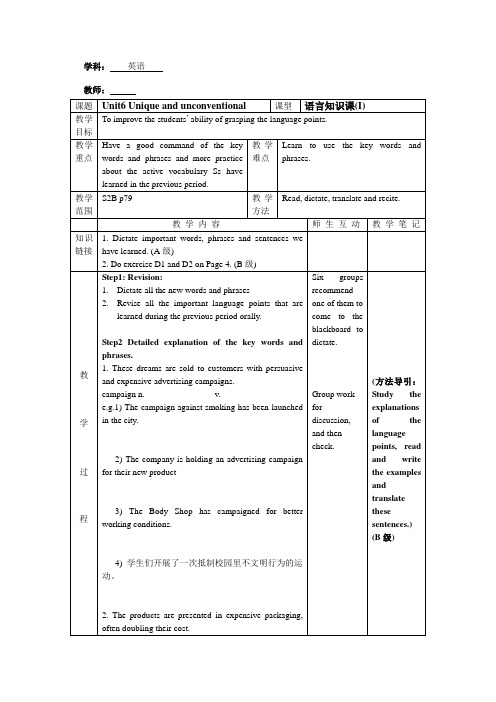
学科:英语教师:课题Unit6 Unique and unconventional课型语言知识课(I)教学目标To improve the students’ ability of grasping the language points.教学重点Have a good command of the keywords and phrases and more practiceabout the active vocabulary Ss havelearned in the previous period.教学难点Learn to use the key words andphrases.教学范围S2B p79 教学方法Read, dictate, translate and recite.教学内容师生互动教学笔记知识链接1. Dictate important words, phrases and sentences we have learned. (A级)2. Do exercise D1 and D2 on Page 4. (B级)教学过程Step1: Revision:1.Dictate all the new words and phrases2.Revise all the important language points that arelearned during the previous period orally.Step2 Detailed explanation of the key words andphrases.1. These dreams are sold to customers with persuasiveand expensive advertising campaigns.campaign n. _______________ v. _______________e.g.1) The campaign against smoking has been launchedin the city.______________________________________________________________________________2) The company is holding an advertising campaignfor their new product______________________________________________________________________________3) The Body Shop has campaigned for betterworking conditions.______________________________________________________________________________4) 学生们开展了一次抵制校园里不文明行为的运动。
牛津上海版高中二年级下学期Unit 6 Problems and solutions课件
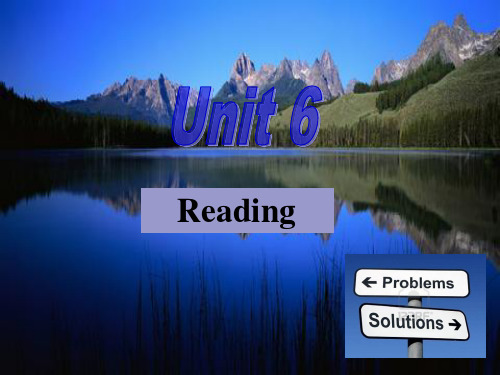
3. How does it persuade the consumers to buy their products?
4. What will happen to the company if its products are unsafe?
5. What does the company do to make sure that their products are safe?
Task2 Have a good knowledge of the Body Shop
It was
to make
she explained …in about language.
the qualities of her cosmetics.
images of beautiful
women, she
D. did not want her customers to look beautiful
4. The writer suggests in Paragraph 5 that some of The Body Shop’s customers __C__. A. like the look of their old cosmetics bottles B. do not need cosmetics bottles C. do not want to create more rubbish D. can refill old cosmetics bottles for free
牛津版高二英语模块6unit 2教案3
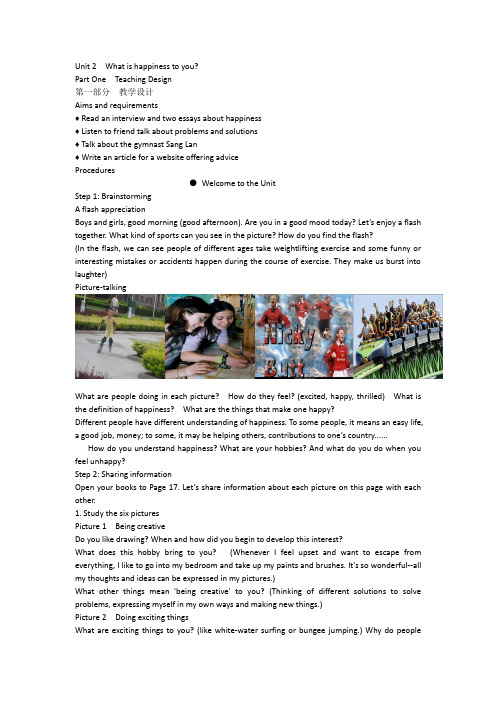
Unit 2 What is happiness to you?Part One Teaching Design第一部分教学设计Aims and requirements♦ Read an interview and two essays about happiness♦ Listen to friend talk about problems and solutions♦ Talk about the gymnast Sang Lan♦ Write an article for a website offering adviceProcedures●Welcome to the UnitStep 1: BrainstormingA flash appreciationBoys and girls, good morning (good afternoon). Are you in a good mood today? Let’s enjoy a flash together. What kind of sports can you see in the picture? How do you find the flash?(In the flash, we can see people of different ages take weightlifting exercise and some funny or interesting mistakes or accidents happen during the course of exercise. They make us burst into laughter)Picture-talkingWhat are people doing in each picture? How do they feel? (excited, happy, thrilled) What is the definition of happiness? What are the things that make one happy?Different people have different understanding of happiness. To some people, it means an easy life, a good job, money; to some, it may be helping others, contributions to one’s country......How do you understand happiness? What are your hobbies? And what do you do when you feel unhappy?Step 2: Sharing informationOpen your books to Page 17. Let’s share information about each picture on this page with each other.1. Study the six picturesPicture 1 Being creativeDo you like drawing? When and how did you begin to develop this interest?What does this hobby bring to you? (Whenever I feel upset and want to escape from everything, I like to go into my bedroom and take up my paints and brushes. It's so wonderful--all my thoughts and ideas can be expressed in my pictures.)What other things mean 'being creative' to you? (Thinking of different solutions to solve problems, expressing myself in my own ways and making new things.)Picture 2 Doing exciting thingsWhat are exciting things to you? (like white-water surfing or bungee jumping.) Why do peoplelike exciting things? They bring lots of fun and help people forget all the troubles and worries. Picture 3 ReadingDo you like reading? Does reading make one happy? Why? It is really enjoyable when reading especially in a peaceful and quiet environment. Sometimes we are so absorbed by the characters in the book and their stories that we forget all about the outside world. Through reading, we gain knowledge and our horizons are broadened.Picture 4 Playing sportWhich are your favorable sports? It's a really good way to make friends, keep fit and relax. Picture 5 Spending time with familyDo you enjoy spending time with your family? When you feel happy or unhappy, do you talk to them about your problems and achievements? Family is important to everyone. It's a perfect time to talk to your family about your problems. They can give you good advice and make you confident. They are also happy for the achievements you made.Picture 6 Learning new thingsHave you ever been to a natural history museum? Why do people like museum? In a museum, we can find out more information than we can just through reading books. Visiting these kinds of places can give us a real insight into history.What other ways do you think may help you learn more new things? (Surfing the Internet and talking to different people.)2. Talk about each picture and exchange opinions with your partner.Which things do you often do and like to do? Why do you feel happy when doing these?Step 3: DiscussionWork in groups of 4 to discuss the three questions and then report the answers to the whole class.1. What are things that make everyone happy?There are some things in life that make us feel happy. For example, as a small child, something as simple as getting some sweets is enough to make him or her into a happy child. As a student, passing an exam can make him or her feel on top of the world. For an adult, getting a great new job or traveling to different parts of the world are some of the happiest times.2. What are the things which make you happy?Eating a hearty meal, getting some new clothes, having enough money for something I really want, reading a great book, watching a really good film, making a new friend or making up with my friends after an argument.3. If you had a friend who was unhappy, how would you try to help him or her?In this case, I will try to be a good listener and understand what has made him or her so upset. Offer some advice if necessary. Invite him to go outside for a walk or go shopping together to cheer him upStep 4: HomeworkRead the two articles on P112-113.Prepare the reading part.●Reading The search for happinessStep 1: Lead-inLet’s enjoy a video. It can make us feel very happy and in good mood. And we can see most ordinary healthy people around us live a happy, meaningful and colourful life. We work and live with smiles every day. But how do you know disabled people stay happy in their life? Today we are going to talk about a special girl named Sang Lan, who used to be a successful gymnast. What do you know about this girl?1. Different people find happiness and fun in different things. There are certainly no criteria assessing which way of being happy is the best. Do you think Sang Lan had had a happy life before she was injured?Do you think Sang Lan has a happy life now?What would you do if you had the same problem?2. Suppose you had a chance to talk face to face with Sang Lan, what would you like most to ask her about?The following are suggested answers:--- childhood and school education--- things or experiences that had left her the deepest impression before the accident--- reasons for learning gymnastics--- things that encourage her during hard times--- current physical condition--- expectations for future--- future career plans--- attitudes towards life, success and failureStep 2: Fast reading for general ideasThe reading text is an interview from a TV programme about happiness. Dr Brain, a psychologist who studies happiness, is interviewed in a television talk show and tells a story about a brave girl called Sang Lan.Answers1. Happiness2. Dr Brain.3. In Ningbo, China in 1981.1. Read the passage again and complete Part C1. Questions in Part C1 are to check your reading comprehension by making correct judgments of the statements.2. Listen to the tape and complete C2. Questions in Part C2 are for students to note some specificMore relevant information in the interview which shows Sang Lan’s personalityBefore going to hospital· being successful in her sport when she was young· being described as energetic, happy and hard -working· working towards something special·trying to make her parents proudWhile staying in hospital·being in good spirits·thinking about what she could do to get better·being proud of the things she had accomplished·feeling happy to be alive, and lucky to have the rest of her life to learn new thingsAfter leaving hospital·studying journalism at Beijing University·hosting a sports show about the 2008 Beijing Olympics·looking forward to playing table tennis in the special Olympics for disabled people in 2008·thinking about positive things and staying optimistic·believing that keeping busy helps her stay positiveStep 4: Practice1. Complete Part DFind these words and expressions in the interview. Guess their meanings from the context. Thenmatch them with the correct definitions.2. Complete Part ERead this newspaper article about Sang Lan. Complete it with the words below.3. Let’s read the Reading strategy on page 19. Do you know what an interview means? Aninterview is a formal meeting at which one person asks another person a series of questions on atopic. When reading or watching an interview, you should pay attention to the topic, the opinionsrelated to the topic, the questions asked and the answers to the questions.Step 5: Post -reading activitiesThink about the following questions again.What is happiness?What is the real value of being alive?Does being healthy and wealthy mean happiness?Does being respected and well -liked mean happiness?2. Have a debate. The topic is “Sang Lan was happier before the accident than she is now.”3. Go over Part F in pairs and continue the dialogue after the example.Step 6: Language PointsVocabulary Words injure, struggle, disability, psychologist, gymnast, tournament , dedicated, energetic, specialist, severe, injury, hopeless, overcome, accomplish, journalism, positive, admirable, rebuild,unbearable, disabled, optimisticuseful expressionsin hospital, devote …to…, apart from, cheer up, in good spirits,rush sb. to, be proud of, stay positivesentencepatterns In case some of our viewers don’t know her story, can you tell us a little bit about Sang Lan and who she is? While she was injured and in hospital, the world was amazed by the way sheremained cheerful.In 1998, a small accident during one of her practice vaults at the Goodwill Gamescould have cost her her future happiness.Step 7: Homework1. Finish Parts A1 and A2 on page 108 in Workbook.2. Go over the reading passage.Answers1 g2 c3 b4 f5 d6 I7 a8 e9 hAnswers1dedicated 2 mistake 3 wall 4 neck5 visitors6 positive7 journalism8 programme●Word powerStep 1: BrainstormingIn this section we’ll learn the words and idioms used to describe emotions and feelings. Now I’d like you to answer the following questions:What words do you know can express happiness?Apart from happiness, what other types of emotions do you know?Can you think of some words that can express these kinds of feelings?(love joy excitement hate fear jealousy delight surprise astonishment frustration depression contentment satisfaction concern worry fury curiosity ) Step 2: Vocabulary learning1. Read the instructions on page 22 and study the examples listed in the table.2. Write the adjective forms of other nouns related to emotion.ReferenceNouns Adjectivesastonishment astonisheddelight delightedfury furiouscuriosity curioussatisfaction satisfieddepression depressedamazement amazeddisappointmemt disappointedStep 3: Practice1. Let’s focus on Part A. Circle the right word according to each different situation.Step 4: CompetitionHow many emotional words do you know? Now I’ll divide you into several groups. You’ll have a competition to see which group has the most words. In the end you need to group emotional words into three different categories: happiness, sadness and anger.·Words describing happiness:Noun forms: joy, happiness, delightAdjective forms: joyful, happy, delighted·Words describing sadness:Noun forms: sadness, depressionAdjective forms: sad, depressed·Words describing anger:Noun forms: anger, furyAdjective forms: angry, furiousStep 5: Vocabulary extension1. Choose the correct word to complete each sentence.①I'm not_____(satisfied, satisfaction) with what I've done. I can't get_____ (satisfied, satisfaction) from it. (satisfied; satisfaction)②I was _____ (amazed, amazement) by the change in his appearance. All of us looked at him in_____ (amazed, amazement). (amazed; amazement)③The boy is _____ (curious, curiosity) about everything. His burning_____ (curious, curiosity) inspires him to learn more. (curious; curiosity)2. Do part C. In the English language, there are some idioms about emotions. Guess their3. Reading comprehensionThere are some very good things about open education. This way of teaching allows the students to grow as people, and to develop their own interests in many subjects. Open education allows students to be responsible for their own education, as they are responsible for what they do in life. Some students do badly in a traditional classroom. The open classroom may allow them to enjoy learning. Some students will be happier in an open education school. They will not have to worry about grades or rules. For students who worry about these things a lot, it is a good idea to be in an open classroom.But many students will not do well in an open classroom. For some students, there are too few rules. These students will do little in school. They will not make good use of open education. Because open education is so different from traditional education, these students may have a problem getting used to making so many choices. For many students it is important to have some rules in the classroom. They worry about the rules even when there are no rules. Even a few rules will help this kind of students. The last point about open education is that some traditionalteachers do not like it. Many teachers do not believe in open education. Teachers who want to have an open classroom may have many problems at their schools.You now know what open education is. Some of its good points and bad points have been explained. You may have your own opinion about open education. The writer thinks that open education is a good idea, but only in theory. In actual fact, it may not work very well in a real class or school. The writer believes that most students, but of course not all students, want some structure in their classes. They want and need to have rules. In some cases, they must be made to study some subjects. Many students are pleased to find subjects they have to study interesting. They would not study those subjects if they did not have to.1. Open education allows the students to ___________ .A. grow as the educated B.be responsible for their futureC. develop their own interests D.discover subjects outside class2. Open education may be a good idea for the students who__________.A.enjoy learning B.worry about gradesC.do well in a traditional classroom D.are responsible for what they do in life.3. Some students will do little in an open classroom because_________ .A.there are too few rules B.they hate activitiesC.open education is similar to the traditional education D.they worry about the rules 4. Which of the following is NOT mentioned in the passage?A.Some traditional teachers do not like it.B.Many teachers do not believe in open education.C.Teachers may have problems in open classrooms.D.The teacher’s feelings and attitudes are important to the students.5. Which of the following best summarizes the passage?A.Open education is a really complex idea.B.Open education is better than traditional education.C.Teachers dislike open education.D.The writer thinks that open education is a good idea in practice.Step 6: HomeworkPart C on page 114 in the Workbook.Prepare Grammar and usage.●Grammar and usageStep 1: General introduction and explanation to past and future tensePast tenseI. The simple past tense:It is often used to talk about something that happened in the past and is now finished.e.g. She worked late into night yesterday.II. The past continuous tense:The tense is to talk about something that happened in the past and continued for some time.e.g. She knew that as a famous dancer she was making her parents proud in those years.III. The past perfect tense:1. The past perfect tense is often used with the simple past tense. If one action happens beforeanother in the past, the past perfect tense is used.e.g. Upon entering the tomb, Carter’s lucky pet bird , which had led him to the place, was eaten by a snake.2. The past perfect tense is sometimes used in reported speeche.g. “We emptied the tomb of everything it contained,” said Carter.Carter said that they had emptied the tomb of everything it contained.3. The use of the past perfect tense simply indicates that an action comes before another past action, used with time expressions such as when, after, before, as soon as, until, by, for and alreadye.g. I had done my homework this morning before I went to the museum.Future tenseI. The form and usage of the simple future tense:1. will/shall do:表示将来发生的动作或出现的状态,shall仅与第一人称连用2. be going to do:表示主语计划打算的行动或看来就要发生的事情3. be doing:表示计划或安排好的动作(go, come, leave, begin 等动词)4. be to do:表示客观上计划或安排好的动作5. be about to do:表示即将发生的动作,一般不带时间副词或短语6. do:表示与安排,计划或时刻表有关的动作;或用于if, when等状语从句中代替will do. II. The usage of the future continuous tense:1. Talk about something that will be in progress at a certain time or over a period of time in the future. (讨论将来某个时间点或时间段正在进行的动作)e.g. Toby will not be in London next Tuesday. He will be climbing in the Himalayas.Toby will be climbing in the Himalayas all next week.Express future without intention. When it is used in this way, we want to indicate that something will happen naturally. It doesn’t imply that the speaker has arranged the action.(表示不包含说话者主观意愿的纯粹将来。
《Unit6Problemsandsolutions》课件高中英语牛津上海版高二下册

• Anita Roddick sold The Body Shop to L’Oreal in 2006. However, she continued to provide guidance to the company and devote herself to her causes, until her untimely death at the age of 64, on 10 September 2007.
• The Body Shop works to five key values:
• • • • • Against animal testing Support community trade Activate self-esteem Defend human rights Protect our planet
Read Para. 4 to Para. 7
• The Body Shop • Describe its products in simple, truthful language _____________________________ Thinks packaging • __________________ is unimportant. Does not spend any money on advertising. • ______________________ pro-environment campaigns • Supports ___________________________
Hale Waihona Puke How does the author view Anita Roddick and the Body Shop?
• Para 3: amazing, unconventional; revolutionize
牛津上海版高中二年级第二学期Unit 6 Problems and solutions

The Nobel Prize Award Ceremonies are traditionally held on 10 December, the anniversary of Alfred Nobel’s death.
The introduction of the ceremony
date frequency place prizes activities guests
Dec. 10th
Once a year
The Stockholm Concert Hall
Diploma, medal Presentation, banquet
Alfred Nobel invented dynamite.
2. When was the first Nobel Prize awarded? A. 1895 B. 1901 C. 1969
The first Nobel Prize was awarded in 1901.
3. Why are the Nobel Prize Award Ceremonies on 10 December each year?
The medal represents the Genius of Medicine holding an open book in her lap, collecting the water pouring out from a rock in order to quench a sick girl’s thirst.
二年级英语下册 unit6 Lesson2教案 沪教牛津版

(沪教牛津版)二年级英语下册教案Unit6Unit 6 Eating and drinkingThe second period一、主要新授内容(new contents)Let’s learn—fork, knifeLet’s act-- Give it to Kitty, Sam.二、学习目标(Objectives)1、学会认读单词fork, knife,增加学生生活用品的词汇量。
2、学习句型Give it to Kitty, Sam.以及应答,在情境中进一步巩固新授单词并正确运用这些单词。
3、结合学习Bring me …这个句型以及应答,引出本课的主题------从小懂得要做一些力所能及的事。
4、结合新句型Give it to Kitty, Sam.,根据名词的单复数不同,可数与不可数的不同,学习比较it和 them之间的区别。
三、教学建议1、任务前期准备阶段(Pre-task preparation section)Pre-task Preparation是指我们要求学生运用目的语(即所学的语言)之前,呈现给学生的新语言材料。
也就是我们常说的:Input。
在这个环节主要让学生获得对新语言材料的第一次感知。
Activity 1 Questions and answers1、教学辅助(Aids)1) 简笔画2)图片2.活动过程(Process)Activity 2 Sound the New Words 1、教学辅助(Aids)1)电脑(2B-U6-7)2)屏幕2.活动过程(Process)可以用类似的方法练习knifeActivity 3 Practice the New Words 1、教学辅助(Aids)1)电脑(2B-U6-8)2)屏幕3)实物2.活动过程(Process)2、任务中期实施阶段(While-task procedure section)While-task Procedure,这是指语言技能的习得过程。
高中英语牛津上海版高二下册Module3《Unit6 Problems and solutions》优质课公开课教师资格证面试试讲教案
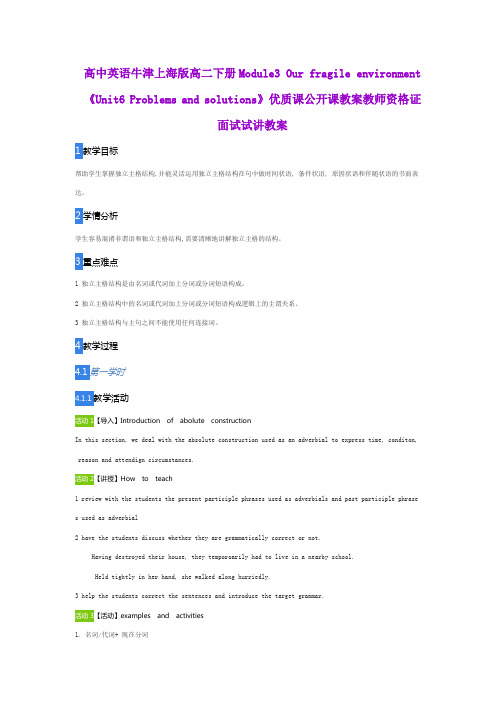
高中英语牛津上海版高二下册Module3 Our fragile environment 《Unit6 Problems and solutions》优质课公开课教案教师资格证面试试讲教案1教学目标帮助学生掌握独立主格结构,并能灵活运用独立主格结构在句中做时间状语, 条件状语, 原因状语和伴随状语的书面表达。
2学情分析学生容易混淆非谓语和独立主格结构,需要清晰地讲解独立主格的结构。
3重点难点1 独立主格结构是由名词或代词加上分词或分词短语构成。
2 独立主格结构中的名词或代词加上分词或分词短语构成逻辑上的主谓关系。
3 独立主格结构与主句之间不能使用任何连接词。
4教学过程4.1第一学时教学活动1【导入】Introduction of abolute constructionIn this section, we deal with the absolute construction used as an adverbial to express time, conditon, reason and attendign circumstances.2【讲授】How to teach1 review with the students the present participle phrases used as adverbials and past participle phrase s used as adverbial2 have the students discuss whether they are grammatically correct or not.Having destroyed their house, they temporoarily had to live in a nearby school.Held tightly in her hand, she walked along hurriedly.3 help the students correct the sentences and introduce the target grammar.3【活动】examples and activities1. 名词/代词+ 现在分词。
牛津版二年级下册精品资源教案 unit2 Lesson6

(沪教牛津版)二年级英语下册Unit2Unit 2 In the circusThe sixth period一、主要新授内容(New contents)Main words: horse bear elephant tiger monkey pandaMain sentences: Look at the … It’s …Come here. Go there. Come back.二、学习目标(Objectives)1、复习字母Aa---Qq,以及其在单词中的发音。
2、对单词的拼读进一步巩固,使学生熟练地运用Look at the … It’s …句型来介绍马戏团里的动物,同时能与旧句型整合对特征、能力等其他方面进行描述。
3、学生通过阅读来作为补充,并从有选择地模仿中学会更全面地介绍来介绍自己的动物好朋友,在同学中间交流分享,懂得动物是我们的好朋友。
三、教学建议1、任务前期准备阶段(Pre-task preparation section)Pre-task Preparation是指我们要求学生运用目的语(即所学的语言)之前,呈现给学生的新语言材料。
也就是我们常说的:Input。
在这个环节主要让学生获得对新语言材料的第一次感知。
Activity 1 (Sing a song)(引入1)1、教学辅助(Aids)1)磁带2)录音机2.活动过程(Process)Activity 2 (Whisper) (引入1)1、教学辅助(Aids)字母卡片2.活动过程(Process)Activity 3 (Say and act)(引入1)1、教学辅助(Aids)1) 音乐2.活动过程(Process)2、任务中期实施阶段(While-task procedure section)While-task Procedure,这是指语言技能的习得过程。
其中分为机械性操练和意义性操练两部分。
机械性操练可以让学生准确地模仿、复说新授的语言,让他们经过从模仿到识记的过程,使新知识由感知、理解、模仿直到储存。
牛津上海版(深圳用)二年级英语下册Module2、Unit6、PE、lessons课件1
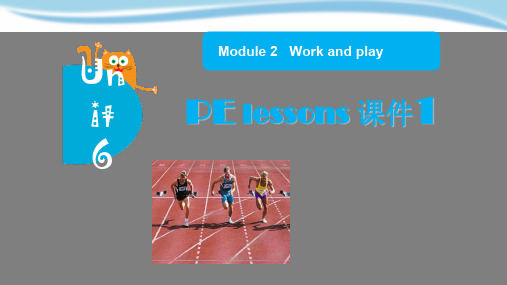
3. Report in your group.
Hi, everyone. I’m … I like … in PE lessons … because … I’m good at … My friend … is …
Un
Module 2 Work and play
it PE lessons 课件1
6
What’s your favourite subject? Why?
Subjects:
Maths
PE
Computer Science
Music
English
Art
Science
Chinese
I like … because … good at it
What sports do you like doing? I like …
long races short races
long jump high jump
high jump
long jump
football volleyball basketball
What sports are you good at?
no homework interesting
like the teacher useful
What’s your favourite subject? Why? My favourite lesson is … because … How often do you have it? I have the lesson … a week.
How many PE lessons do you have every week? Do you like PE lessons? What do you like doing in PE lessons?
牛津module6unit2Task
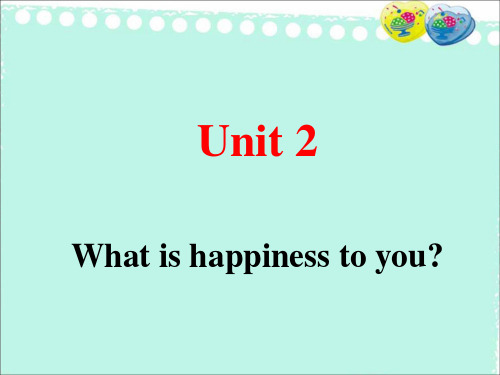
[知识链接]
distribute, divide, allocate这些动词均含“分 配,分发”之意。 distribute通常指以整体或定量分为若干份来 分配。 divide是普通用词,侧重将某物分成若干份 分配给他人,当某物一分为二时,含平均分 配之意。 allocate主要指金钱、财产、权力或领土等的 分配,着重分配的比例和专门用途。
[知识链接]
believe, believe in这一对词语都表示“相信 不疑”的意思,但词意有细微的区别。 believe表示“相信、信以为真”(to accept as true)之意,是及物动词,其后 直接跟宾语。 believe in则表示“信仰、信任”(to have faith in somebody or something)之意,是 一个动介型短语动词,其后的常用搭配语 为:有关宗教、理论、原则、概念及可信 任之人。
[翻译句子]
他发誓服从国王。 ____________________________________ He swore to obey the king.
一个人遵守法律是必要的。 ____________________________________ It is necessary that one should obey the law.
What problems does Ma Jie have?
If you were Ma Jie, what would you do to solve the problem?
You decided to call Ma Jie to find more about his problems. Listen to what he says and complete the notes. (Part B)
- 1、下载文档前请自行甄别文档内容的完整性,平台不提供额外的编辑、内容补充、找答案等附加服务。
- 2、"仅部分预览"的文档,不可在线预览部分如存在完整性等问题,可反馈申请退款(可完整预览的文档不适用该条件!)。
- 3、如文档侵犯您的权益,请联系客服反馈,我们会尽快为您处理(人工客服工作时间:9:00-18:30)。
Unit 6 Problems and solutions【教学目标】独立主格结构的相关知识。
【教学重难点】独立主格结构的相关知识的运用。
【教学过程】独立主格结构概念“独立主格结构”就是由一个相当于主语的名词或代词加上非谓语动词、形容词(副)词或介词短语构成的一种独立成分。
该结构不是句子,也不是从句,所以它内部的动词不能考虑其时态、人称和数的变化,它与主句之间不能通过并列连词连接,也不能由从句引导词引导,通常用逗号与主句隔开。
独立主格结构在很多情况下可以转化为相应的状语从句或者其他状语形式,但很多时候不能转化为分词形式,因为它内部动词的逻辑主语与主句主语不一致。
独立主格的特点【注意】1.当独立主格结构中的being done表示“正在被做时”,being不可以被省略。
2.当独立主格结构的逻辑主语是it, there时,being不可以省略。
独立主格结构的用法。
独立主格结构在句中往往做状语,表时间、原因、条件、方式或伴随状况。
【注意】独立主格结构表示时间、条件或原因时,相当于一个状语从句,一般放在句首,表示原因时还可放在句末;表伴随状况或补充说明时,相当于一个并列句,通常放于句末。
非谓语动词独立主格结构。
“名词或代词+非谓语动词”结构构成的独立主格结构称为非谓语动词的独立主格结构。
名词或代词和非谓语动词具有逻辑上的主谓关系。
1.不定式构成的独立主格结构2.不定式构成的独立主格结构往往表示还未发生的行为或状态,在句中常作原因状语,有时做条件状语。
3.Lots of homework to do, I have to stay home all day.4.由于很多作业要做,我只好待在家里。
5.So many children to look after, the mother has to quit her job.6.如此多的孩子要照顾,这个妈妈不得不辞掉她的工作。
7.动词+ing形式的独立主格结构8.动词-ing形式的句中作状语时,其逻辑主语必须是主句的主语,否则就是不正确的。
动词-ing形式的逻辑主语与主句的主语不一致时,就应在动词的-ing形式前加上逻辑主语,构成动词-ing 形式的独立主格结构,逻辑主语与动词间为主谓关系,是分词的动作执行者,分词表示的动作是逻辑主语发出的动作。
9.We redoubled our efforts, each man working like two.10.我们加倍努力,每个人就像在干两个人的活。
11.The governor considering the matter, more strikers gathered across his path.12.总督思考这个问题时,更多的罢工工人聚集到他要通过的路上。
13.The guide leading the way, we had no trouble getting out of the forest.14.在向导的带领下,我们轻松地走出了森林。
15.过去分词形式的独立主格16.过去分词形式的独立主格结构是由“逻辑主语+过去分词”构成。
逻辑主语与动词之间为动宾关系,它是分词的动作承受者,这一结构在句中作时间状语,原因状语、伴随状语、条件状语等。
17.This done, we went home.做完这个,我们就回家了。
18.All our savings gone, we started looking for jobs.19.积蓄用完后,我们都开始找工作。
20.More time and money given, we can finish the work in advance.21.如果给予更多的时间和金钱,我们能提前完成这个工作。
其他形式的独立主格结构1.逻辑主语+名词/形容词/副词/介词短语2.With/without+宾+宾补独立主格结构的区分及注意事项。
1.分词结构、独立主格结构作状语的注意事项。
2.(1)使用分词短语、独立主格结构分别在句子中作状语时要注意,它们与主句之间不应有从属连词(如when, if, as soon as, as, while等)或并列连词(and, but, or等)3.(2)在使用独立主格结构、分词作句子的状语时,一定要看句子主语同这些结构的逻辑关系。
4.a.当句子主语与状语内部动词之间有逻辑上的主谓或动宾关系时,状语可用分词或从句表示。
5.When we see from the top floor, we can find the garden more beautiful —>Seeing from the top of the floor, we can find the garden more beautiful.从顶楼上看,花园要漂亮得多。
6.b.若句子主语与状语内动词之间不存在逻辑上的主谓或动宾关系且状语内有自己的逻辑主语时,该状语不能用分词结构,只能用独立主格结构或从句。
7.If time permits, we’d better have a rest at this weekend.—>Time permitting, we’d better have a rest at this weekend.时间允许的话,这周末我们最好休息一下。
8.(3)分词结构的逻辑主语不是总和主句的主语一致,也可能是主句的其他成分。
9.Looking for my watch in the room, it had taken me a long time.10.在屋里找手表花了我很长时间。
11.(4)有些分词结构在句子中找不到它的逻辑主语。
12.When planting these flowers, care must be taken not to damage the root.13.(我们)种花时必须小心不要把根弄坏了。
14.独立主格结构没有所有格形式。
15.The chief editor arriving, we began the meeting.主编来了,我们开始开会。
16.独立主格结构中,当表人体部位的词作逻辑主语时,不及物动词用现在分词,及物动词用过去分词。
17.He lay there, his teeth set, his fists clenched, his eyes looking straight up.18.他躺在那里,牙关紧闭,双拳紧握,两眼直视上方。
19.独立成分。
20.(1)有些分词短语可以独立存在,在句子中没有逻辑上的主语,作为习惯用语。
这些短语有:21.generally speaking一般来说,frankly speaking坦白说,strictly speaking严格来说,talking of谈到,speaking of说到,judging from由…判断,22.taking all things into consideration把一切考虑在内,considering that考虑到,allowing for 考虑到, putting it mildly说的温和些23.Danny has too much homework considering that he is young.24.考虑到Danny还小,他的作业也太多了。
25.(2)有些固定短语是带to的不定式,表明说话人的立场和态度,在句中作独立成分。
这些短语有:26.to be honest老实说,to be sure确实,to tell you the truth说实话,to cut a long story short 长话短说,to be frank 坦率地说,to make matter/things worse更糟糕的是27.To make things worse, many of the men have gone off to cities in search of higher pay, leaving women from nearby villages to carry on with the work.28.更糟的是,许多男人都到城市里找高薪的工作区了,留下附近村庄的妇女积蓄承担修复工作。
29.独立主格结构的时态问题。
30.独立主格结构作时间或原因状语时,可用完成时,表示该动作发生在位于动作之前。
31.The listeners having taken their seats, the concert began.32.听众坐好后,音乐会开始了。
33.Tom having been late over and over, his boss was very disappointed.34.Tom总是迟到,他的老板很失望。
练习:1.Everything ___ into consideration, they ought to have another chance.A.to take B.taken C.to be taken D.taking2.An expert ___ to help them tomorrow, they are sure to work out the problem.A.will come B, coming C.to come D.having come3.The meeting ___ over, he went to pick up his son directlyA.to be B.is C.was D.being4.--- They sat still in the room, ___.--- Why did they do like that?A.drawing the curtains B.with the curtains drawnC.with the curtains drawing D.having the curtains drawn5.The sun ___, they continued their way.A.has risen B.having risen C.has raised D.having raised6.The country has already sent up three unmanned spacecraft, the most recent ___ at the end of last March.A.has been launched B.having been launchedC.being launched D.to be launched7.Here are two volumes, the third one ____ next month.A.comes out B.came out C.coming out D.to come out8.With his son___, the old man felt unhappy.A.to disappoint B.to be disappointingC.disappointing D.being disappointed9.--- Come on, please give me some ideas about the project.---Sorry. With so much work ___ my mind, I almost break down.A.filled B.filling C.to fill D.being filled10.John received an invitation to dinner, and with his work ___, he gladly accepted it.A.finished B.finishing C.having finished D.was finished11.___, I had to ask for two days’ leave.A.Mother being ill B.Mother ill C.As mother was ill D.A, B and C 12.With so many books ___, I couldn’t go to surf the Internet.A.to read B.to be read C.reading D.read13.The thief stood before the policeman ____ admitting what he had done.A.with his dropping head B.dropping his headC.raising his head D.with his head down14.Winter ___, it is time to buy warm clothes.A.has come on B.is coming on C.coming on D.comes on15.The old man lay on his back at the corner of the street, his eyes ___ and his hands ___. A.close, tremble B.closed, tremblingC.closing, trembling D.closed, trembled16.With nothing __ to burn, the fire became weak and finally died out.A.leaving B.leave C.left D.to leave17.It was a pity that the great writer died ___ his works unfinished.A.for B.with C.of D.from18.I couldn’t do my homework with that noise ___ on.A.to go B.went C.going D.goes19.___ two exams to worry about, I have to work really hard this weekend.A.Because of B.With C.As for D.Besides 20.Tom came home, ___.A.a dog following him B.a dog followed himC.being followed him D.a dog was followed him答案:BCDBB BDCBA DADCB CBCBA。
